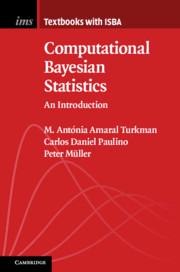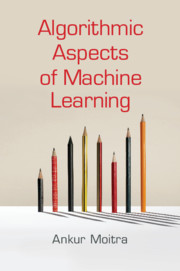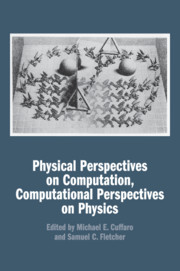Refine search
Actions for selected content:
1004 results in Computational statistics, machine learning and information science
7 - Model Selection and Trans-dimensional MCMC
-
- Book:
- Computational Bayesian Statistics
- Published online:
- 18 February 2019
- Print publication:
- 28 February 2019, pp 129-149
-
- Chapter
- Export citation
2 - Representation of Prior Information
-
- Book:
- Computational Bayesian Statistics
- Published online:
- 18 February 2019
- Print publication:
- 28 February 2019, pp 17-27
-
- Chapter
- Export citation
1 - Bayesian Inference
-
- Book:
- Computational Bayesian Statistics
- Published online:
- 18 February 2019
- Print publication:
- 28 February 2019, pp 1-16
-
- Chapter
-
- You have access
- Export citation

Computational Bayesian Statistics
- An Introduction
-
- Published online:
- 18 February 2019
- Print publication:
- 28 February 2019

Algorithmic Aspects of Machine Learning
-
- Published online:
- 28 September 2018
- Print publication:
- 27 September 2018
Index
-
- Book:
- Algorithmic Aspects of Machine Learning
- Published online:
- 28 September 2018
- Print publication:
- 27 September 2018, pp 150-152
-
- Chapter
- Export citation
Preface
-
- Book:
- Algorithmic Aspects of Machine Learning
- Published online:
- 28 September 2018
- Print publication:
- 27 September 2018, pp vii-viii
-
- Chapter
- Export citation
Bibliography
-
- Book:
- Algorithmic Aspects of Machine Learning
- Published online:
- 28 September 2018
- Print publication:
- 27 September 2018, pp 143-149
-
- Chapter
- Export citation
3 - Tensor Decompositions: Algorithms
-
- Book:
- Algorithmic Aspects of Machine Learning
- Published online:
- 28 September 2018
- Print publication:
- 27 September 2018, pp 29-47
-
- Chapter
- Export citation
4 - Tensor Decompositions: Applications
-
- Book:
- Algorithmic Aspects of Machine Learning
- Published online:
- 28 September 2018
- Print publication:
- 27 September 2018, pp 48-70
-
- Chapter
- Export citation
7 - Gaussian Mixture Models
-
- Book:
- Algorithmic Aspects of Machine Learning
- Published online:
- 28 September 2018
- Print publication:
- 27 September 2018, pp 107-131
-
- Chapter
- Export citation
2 - Nonnegative Matrix Factorization
-
- Book:
- Algorithmic Aspects of Machine Learning
- Published online:
- 28 September 2018
- Print publication:
- 27 September 2018, pp 4-28
-
- Chapter
- Export citation
6 - Sparse Coding
-
- Book:
- Algorithmic Aspects of Machine Learning
- Published online:
- 28 September 2018
- Print publication:
- 27 September 2018, pp 89-106
-
- Chapter
- Export citation
Contents
-
- Book:
- Algorithmic Aspects of Machine Learning
- Published online:
- 28 September 2018
- Print publication:
- 27 September 2018, pp v-vi
-
- Chapter
- Export citation
1 - Introduction
-
- Book:
- Algorithmic Aspects of Machine Learning
- Published online:
- 28 September 2018
- Print publication:
- 27 September 2018, pp 1-3
-
- Chapter
- Export citation
8 - Matrix Completion
-
- Book:
- Algorithmic Aspects of Machine Learning
- Published online:
- 28 September 2018
- Print publication:
- 27 September 2018, pp 132-142
-
- Chapter
- Export citation
5 - Sparse Recovery
-
- Book:
- Algorithmic Aspects of Machine Learning
- Published online:
- 28 September 2018
- Print publication:
- 27 September 2018, pp 71-88
-
- Chapter
- Export citation
Frontmatter
-
- Book:
- Algorithmic Aspects of Machine Learning
- Published online:
- 28 September 2018
- Print publication:
- 27 September 2018, pp i-iv
-
- Chapter
- Export citation

Physical Perspectives on Computation, Computational Perspectives on Physics
-
- Published online:
- 17 May 2018
- Print publication:
- 17 May 2018
Part III - Physical Perspectives on Computer Science
-
- Book:
- Physical Perspectives on Computation, Computational Perspectives on Physics
- Published online:
- 17 May 2018
- Print publication:
- 17 May 2018, pp 151-152
-
- Chapter
- Export citation
